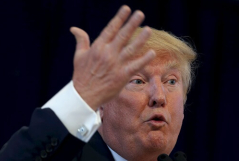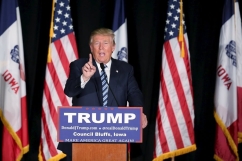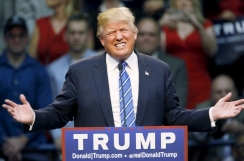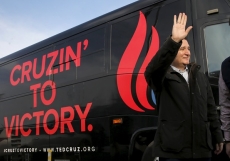Donald Trump is seen as a potentially "good" or "great" president by Republican voters even though he is not widely regarded as religious, according to a new survey.
The conventional wisdom in American politics has long been that someone who is not religious cannot be elected president of the United States. Most Americans have consistently said that it is important to them that the president have strong religious beliefs, Pew Research says today.
Being an atheist remains one of the biggest liabilities that a presidential candidate can have, the latest Pew survey reports.
Half of American adults would be less likely to vote for a candidate who does not believe in God, while just six per cent say they would be more likely to vote for a non-believer. However at the same time, the proportion who would oppose an atheist candidate has been consistently falling.
Pew Research reports: "Moreover, one of the candidates who is widely viewed by Republicans as a potentially 'good' or 'great' president, Donald Trump, is not widely viewed as a religious person, even by those in his own party."
And on the Democratic side, the share of Americans who say Hillary Clinton is not a religious person now stands at 43 per cent, significantly higher compared with 2007, when she first sought the nomination.
Overall, five per cent of Republicans and those who lean toward the Republican Party say Trump is a "very religious" person and 39 per cent believe him to be "somewhat religious" person. Almost half (47 per cent) say he is "not too religious" or "not at all religious". Eight-in-ten GOP voters think Ben Carson is a religious person, three-quarters view Ted Cruz as a religious person, and seven-in-ten say the same about Marco Rubio.
Pew Research surveyed more than 2,000 adults by telephone earlier this month.
"White House contenders need not be seen as very religious to be broadly acceptable to the voting public," Pew Research says. However, the new survey also confirms that being an atheist continues to be one of the biggest perceived shortcomings a candidate can have, with 51 per cent of adults saying they would be less likely to vote for a presidential candidate who does not believe in God.
Indeed, in the eyes of the public, being a nonbeliever remains a bigger drawback than having had an extramarital affair. Just 37 per cent say they would be less likely to support a candidate who had been unfaithful. One-in-four would be less likely to support a former pot-smoker.
More than half of US adults said it was "very important" or "somewhat important" to have someone in the White House who shares their religious perspective. This view is particularly common among Republicans.
In addition, four-in-ten Americans said they would be less likely to support a candidate for president who is Muslim, though this has fallen since the question was first asked in 2007. Republicans and white evangelical Protestants held particularly negative views of potential Muslim candidates. Roughly six-in-ten or more in each group say they would be less likely to support a Muslim candidate.

















